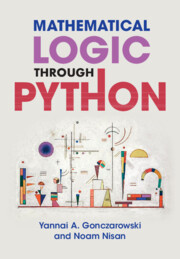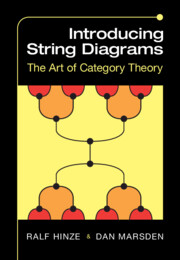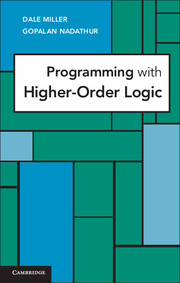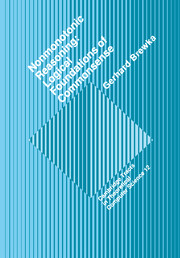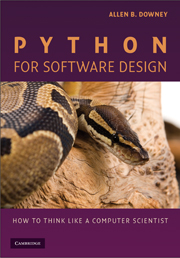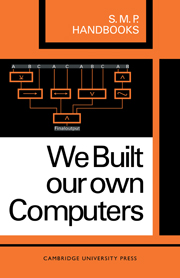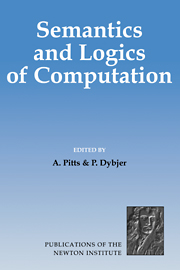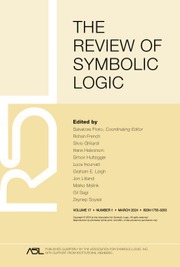Mathematical Logic through Python
£59.99
- Authors:
- Yannai A. Gonczarowski, Harvard University, Massachusetts
- Noam Nisan, Hebrew University of Jerusalem
- Date Published: September 2022
- availability: Available
- format: Hardback
- isbn: 9781108845076
£
59.99
Hardback
Other available formats:
Paperback, eBook
Looking for an inspection copy?
This title is not currently available on inspection
-
Using a unique pedagogical approach, this text introduces mathematical logic by guiding students in implementing the underlying logical concepts and mathematical proofs via Python programming. This approach, tailored to the unique intuitions and strengths of the ever-growing population of programming-savvy students, brings mathematical logic into the comfort zone of these students and provides clarity that can only be achieved by a deep hands-on understanding and the satisfaction of having created working code. While the approach is unique, the text follows the same set of topics typically covered in a one-semester undergraduate course, including propositional logic and first-order predicate logic, culminating in a proof of Gödel's completeness theorem. A sneak peek to Gödel's incompleteness theorem is also provided. The textbook is accompanied by an extensive collection of programming tasks, code skeletons, and unit tests. Familiarity with proofs and basic proficiency in Python is assumed.
Read more- Makes mathematical logic more accessible to students with less mathematical background by steering away from the rigorous 'definition-theorem-proof' style of mathematics courses and instead using programming as a tool to reason about logic
- Presents material in a sequence of tasks, with over 150 tasks throughout the book, which provides students with a clear, explicit, and deep hands-on understanding
- Follows the same set of topics typically covered in a traditional first course mathematical logic
- Can also be used as a supplementary text for instructors wanting to incorporate programming into their basic logic, discrete mathematics, and automata/formal language courses
- Extra online resources include code skeletons and APIs for all tasks in the book, as well as unit tests that provide automatic testing of the solution to every task in the book, all in the Python programming language
Reviews & endorsements
'The authors transformed the first course in Mathematical Logic – an experience that many students view as daunting and technical – into an inspiring journey that sails playfully yet rigorously from logic's first principles to Gödel's Completeness Theorem. The secret sauce is making progress by writing many little Python programs instead of proving theorems, a hands-on approach that suits computer science students perfectly.' Shimon Schocken, Reichman University
See more reviews'Mathematical logic is all about expressions and syntactic operations, and many of its best ideas find a natural home in computer science. Gonczarowski and Nisan make the subject come alive by opening it up to computational implementation and exploration.' Jeremy Avigad, Carnegie Mellon University
'Mathematical Logic through Python offers a refreshingly innovative approach that makes it stand out among several excellent books on mathematical logic. By building on readers' experience and intuition through programming, it naturally provides them with a deep understanding of the fundamental concepts of mathematical logic that underly computer science.' Yoram Moses, Technion - Israel Institute of Technology
'… a very useful addition to the existing library of mathematical logic textbooks.' Tim Swift, Irish Mathematical Society Bulletin
Customer reviews
Not yet reviewed
Be the first to review
Review was not posted due to profanity
×Product details
- Date Published: September 2022
- format: Hardback
- isbn: 9781108845076
- length: 280 pages
- dimensions: 260 x 181 x 17 mm
- weight: 0.74kg
- availability: Available
Table of Contents
Preface
Introduction and Overview
Part I. Propositional Logic:
1. Propositional Logic Syntax
2. Propositional Logic Semantics
3. Logical Operators
4. Proof by Deduction
5. Working with Proofs
6. The Tautology Theorem and the Completeness of Propositional Logic
Part II. Predicate Logic:
7. Predicate Logic Syntax and Semantics
8. Getting Rid of Functions and Equality
9. Deductive Proofs of Predicate Logic Formulas
10. Working with Predicate Logic Proofs
11. The Deduction Theorem and Prenex Normal Form
12. The Completeness Theorem
13. Sneak Peek at Mathematical Logic II: Godel's Incompleteness Theorem
Cheatsheet Axioms and Axiomatic Inference Rules Used in this Book
Notes
Index.
Sorry, this resource is locked
Please register or sign in to request access. If you are having problems accessing these resources please email [email protected]
Register Sign in» Proceed
You are now leaving the Cambridge University Press website. Your eBook purchase and download will be completed by our partner www.ebooks.com. Please see the permission section of the www.ebooks.com catalogue page for details of the print & copy limits on our eBooks.
Continue ×Are you sure you want to delete your account?
This cannot be undone.
Thank you for your feedback which will help us improve our service.
If you requested a response, we will make sure to get back to you shortly.
×
